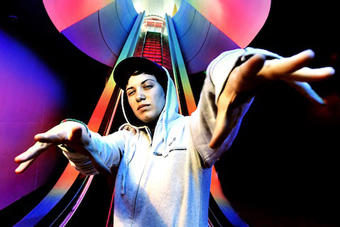One on One with Detroit’s own Invincible
By FinalCall.com News | Last updated: Jul 12, 2013 - 1:06:22 AMWhat's your opinion on this article?
'The ultimate critique is living the solution'
While recently in Detroit, it was connected Hip-Hop Activist Invincible who showed me around the city. She took me to several areas within the Cass Corridor and introduced me to numerous activists who are fighting for the soul of Detroit, Michigan. They are fighting against gentrification, fighting against human trafficking, fighting against poverty, and discrimination. On her Twitter feed she writes: “The ultimate critique is living the solution.” It was clear to me during the time we spent that she operates using that basic axiom in all areas of her existence.

***
Ashahed M. Muhammad—The Final Call (FC:) I know one thing that I wanted to ask about which I ask many artists—and I love the name Invincible—its dope. How did you get it?

Invincible (I:) The way I first got the name Invincible was when I first started really taking lyricism seriously. I was about 15 years old. I was actually nine when I started rapping. One of the ways I learned English was through listening to Hip-Hop writing down the words. I moved back to the U.S. from the Middle East—I was living in Occupied Palestine and didn’t speak English. I learned English through music but then didn’t really start taking the craft seriously and started to perform regularly when I was about 15. And one of the people that I used to rhyme with was a graffiti artist and we were trying to come up with a name that was appropriate and you know, that was the battle era and everybody was very competitive in nature as most up and coming young rappers are. And so the name Invincible stuck. My given name starts with an ‘I’ (Ilana) so it was ‘Invincible I’ to begin with. The name looked dope when it was written in graffiti and it was competitive but what it ended up taking on was it was transformed into a whole other meaning for me. You know looking at I think it was ‘The Art of War’ around that time and a lot of the lessons in that text gets into this idea of vulnerability as invincibility. So when you take a chance and invest in the parts of you that are most vulnerable and that are the weakest links in yourself or in your community, that’s how you gain invincibility. It’s that concept of what doesn’t kill you makes you stronger. Because it is those moments where you are almost at that point of no return whether that’s death or whether that’s failure, that you absolutely can see the greatest possibilities.
(FC:) Now let me get this straight you were living in Occupied Palestine until you were 15?
(I:) I was born in the U.S., moved to Occupied Palestine when I was one. My mother was born in Palestine in ’37 before it was occupied and colonized. Her parents moved to Palestine in their teens from Europe. A majority of my family were living in Europe, Austria, Germany, Poland—Polish in origin—for the most part. A majority of my family were actually murdered in Europe in that timeframe in the ‘30’s and ‘40’s but the family that did survive for the most part was those who had moved to Palestine and was there as part of the Zionist settlement of the state and they had my mom there. My mom was raised there, she moved to the U.S. later in her life and had me and then when I was one, we moved back there to be closer to her parents before they passed away. Once they passed we moved back to the U.S. when I was 7-years old.
(FC:) So you grew up basically speaking Hebrew, that explains it, because I noticed in some songs that you spoke like a native speaker and I wondered how you did it, before I knew your background.
(I:) I don’t speak it any longer. I forgot it pretty quickly after we moved to the U.S. That was my first language.
(FC:) A couple of your songs such as ‘Locusts,’ and ‘State of Emergency’ from your ‘Shape Shifters’ project—it’s interesting the way you blend the message social responsibility and the lyrical content with the beat and a flow weaving the messages in there. What do you hope to accomplish with your lyrics?
(I:) Well I think I’ve evolved over the years. I think a lot of my music that you’re mentioning, I did my best to slip the medicine in where it was like quality song writing whether it was a story or a concept or a certain flow that was going to still make it a musical innovative piece. To me it’s like— the subject matter was always the focal point. I was always trying to convey a certain subject that I was trying to advocate for or educate people about or be able to make an impact on particular issues. I’ve evolved that since ‘Shape shifters’ project you mentioned. Now I’m working on a collaborative project called ‘Complex Movements’ and it’s a collective with myself and three other Detroit artists. I’m the only lyricist in the project but we’re like a multi-media collaborative and we’re looking at basically creating this science fiction parable that is multi-dimensional story that’s telling this larger experience of how change comes about. I’m trying to change the way people think about making change and I’m doing that through connecting metaphors in complex science—particularly in nature and technology—to inform how people look at change making. So a lot of the new work I’m doing is really like, almost like, I’m taking you to another world.
With this project it’s almost like I’m trying to create a world where all these issues are taking place simultaneously which is how our world actually functions. So many intersections and connections and then the way the project is going to take place, our soft launch is at the Charles Wright African American History Museum through July 14. It will be up as an art exhibit with multiple performances throughout the run. It’s kind of like a participatory video game that the audience has agency in shaping the way that the story is unfolded and they actually unlock aspects of the story.
(FC:) I don’t hear any songs from you that are not serious. No party songs, or no songs for the ladies or fellas however, you also don’t sound preachy. How do you pull that off?
(I:) It’s come to a point where I no longer just am trying to directly educate or inform people about one specific issue but I’m trying to embody through every layer and every scale of the project this idea that all the issues that we’re addressing are interconnected. That all of us have agency to change them and that the way that we need to approach change needs to be in alignment with our greatest vision for how we would like to change it, because a lot of times my experience with activism is that people perpetuate the same power dynamics that they’re hoping to untangle in the process of doing activism; in the process of working for change. We replicate the same mistakes of the power structure that we’re hoping to destroy and so we keep it alive, we feed it. My bigger question becomes how do we actually start to embody and model a new way of being the world.
(FC:) Thank You.
(Invincible is on Twitter @invincibleDET on the web. For booking and upcoming shows check out EMERGENCEmedia.org)
INSIDE STORIES AND REVIEWS
-
-
About Harriett ... and the Negro Hollywood Road Show
By Rabiah Muhammad, Guest Columnist » Full Story -
Skepticism greets Jay-Z, NFL talk of inspiring change
By Bryan 18X Crawford and Richard B. Muhammad The Final Call Newspaper @TheFinalCall » Full Story -
The painful problem of Black girls and suicide
By Charlene Muhammad -National Correspondent- » Full Story -
Exploitation of Innocence - Report: Perceptions, policies hurting Black girls
By Charlene Muhammad -National Correspondent- » Full Story -
Big Ballin: Big ideas fuel a father’s Big Baller Brand and brash business sense
By Bryan Crawford -Contributing Writer- » Full Story






 Click Here Stay Connected!
Click Here Stay Connected!








